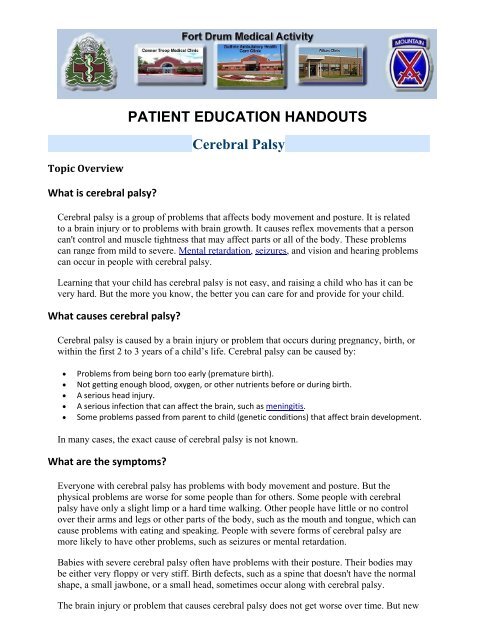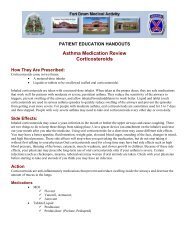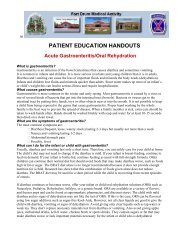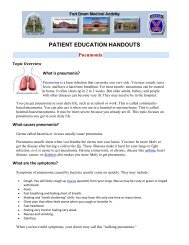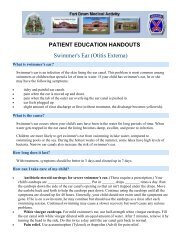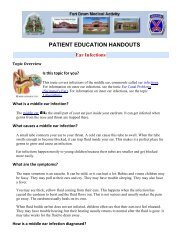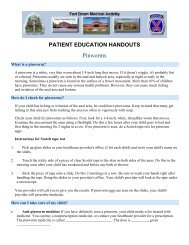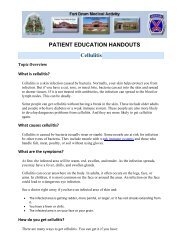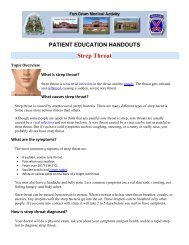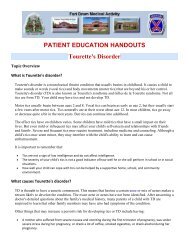PATIENT EDUCATION HANDOUTS Cerebral Palsy
PATIENT EDUCATION HANDOUTS Cerebral Palsy
PATIENT EDUCATION HANDOUTS Cerebral Palsy
Create successful ePaper yourself
Turn your PDF publications into a flip-book with our unique Google optimized e-Paper software.
<strong>PATIENT</strong> <strong>EDUCATION</strong> <strong>HANDOUTS</strong><br />
<strong>Cerebral</strong> <strong>Palsy</strong><br />
Topic Overview<br />
What is cerebral palsy<br />
<strong>Cerebral</strong> palsy is a group of problems that affects body movement and posture. It is related<br />
to a brain injury or to problems with brain growth. It causes reflex movements that a person<br />
can't control and muscle tightness that may affect parts or all of the body. These problems<br />
can range from mild to severe. Mental retardation, seizures, and vision and hearing problems<br />
can occur in people with cerebral palsy.<br />
Learning that your child has cerebral palsy is not easy, and raising a child who has it can be<br />
very hard. But the more you know, the better you can care for and provide for your child.<br />
What causes cerebral palsy<br />
<strong>Cerebral</strong> palsy is caused by a brain injury or problem that occurs during pregnancy, birth, or<br />
within the first 2 to 3 years of a child’s life. <strong>Cerebral</strong> palsy can be caused by:<br />
• Problems from being born too early (premature birth).<br />
• Not getting enough blood, oxygen, or other nutrients before or during birth.<br />
• A serious head injury.<br />
• A serious infection that can affect the brain, such as meningitis.<br />
• Some problems passed from parent to child (genetic conditions) that affect brain development.<br />
In many cases, the exact cause of cerebral palsy is not known.<br />
What are the symptoms<br />
Everyone with cerebral palsy has problems with body movement and posture. But the<br />
physical problems are worse for some people than for others. Some people with cerebral<br />
palsy have only a slight limp or a hard time walking. Other people have little or no control<br />
over their arms and legs or other parts of the body, such as the mouth and tongue, which can<br />
cause problems with eating and speaking. People with severe forms of cerebral palsy are<br />
more likely to have other problems, such as seizures or mental retardation.<br />
Babies with severe cerebral palsy often have problems with their posture. Their bodies may<br />
be either very floppy or very stiff. Birth defects, such as a spine that doesn't have the normal<br />
shape, a small jawbone, or a small head, sometimes occur along with cerebral palsy.<br />
The brain injury or problem that causes cerebral palsy does not get worse over time. But new
symptoms may appear, or symptoms may change or get worse as your child gets older. This<br />
is why some babies born with cerebral palsy do not show clear signs of it right away.<br />
How is cerebral palsy diagnosed<br />
Most of the time, doctors will diagnose cerebral palsy based on a child's medical history.<br />
Your doctor will ask about your child’s growth and about any problems you may have<br />
noticed. You may be asked to answer questions about your child’s development. The doctor<br />
may also do a physical exam.<br />
Other tests, such as a CT scan or an MRI of your child’s head, may be done. Or the doctor<br />
may look at ultrasound pictures of the brain. These tests can help the doctor find out the<br />
cause of cerebral palsy.<br />
It can take several months to several years to find out if a child has cerebral palsy. Some of<br />
the time, a doctor can find out if a child has cerebral palsy by the time the child is 18 months<br />
old. If your child has a severe form of cerebral palsy, a doctor may be able to pinpoint the<br />
problem within the first few weeks of your child’s life. But parents are often the first to<br />
notice that their baby does not have the abilities and skills that are common in other children<br />
in the same age group. These developmental delays can be early signs of cerebral palsy.<br />
How is it treated<br />
<strong>Cerebral</strong> palsy can't be cured, so your child will probably need lifelong treatment. But<br />
treatments can help deal with symptoms, prevent problems, and make the most of your<br />
child’s abilities. Physical therapy is one of the most important treatments. Medicines,<br />
surgery, and special equipment such as a walker can also help.<br />
What can you do to cope<br />
Meeting the daily needs of a family member with cerebral palsy can be very hard. If your<br />
child has cerebral palsy, seek family and community support. It may help to join a support<br />
group or to talk with other parents who have a child with special needs so you don't feel<br />
alone. You may also find counseling useful. It may help you understand and deal with the<br />
wide range of emotions that you may feel when your child has cerebral palsy. Your child<br />
will need help too. Providing emotional support for your child can help him or her deal with<br />
having cerebral palsy.<br />
Frequently Asked Questions<br />
Learning about cerebral<br />
palsy:<br />
Being diagnosed:<br />
• What is cerebral palsy<br />
• What causes it<br />
• Can I prevent it<br />
• What are the symptoms<br />
• How does cerebral palsy progress<br />
• What increases the risk<br />
• How common is it<br />
• Are there different types of cerebral palsy<br />
• Who can diagnose cerebral palsy<br />
• How is it diagnosed
Getting treatment:<br />
Living with cerebral palsy:<br />
• How is cerebral palsy treated<br />
• Will my child need medication<br />
• Will my child need surgery<br />
• What other treatments might be recommended<br />
• What can I do at home to manage my child's cerebral<br />
palsy<br />
• When should I call a health professional<br />
Author: Sabra L. Katz‐Wise<br />
Ralph Poore<br />
Last Updated: November 20, 2006<br />
Medical Review: Michael J. Sexton, MD ‐ Pediatrics<br />
Louis Pellegrino, MD ‐ Developmental Pediatrics<br />
_________________________________________________________________________________________________<br />
Reviewed 9 June 2008


